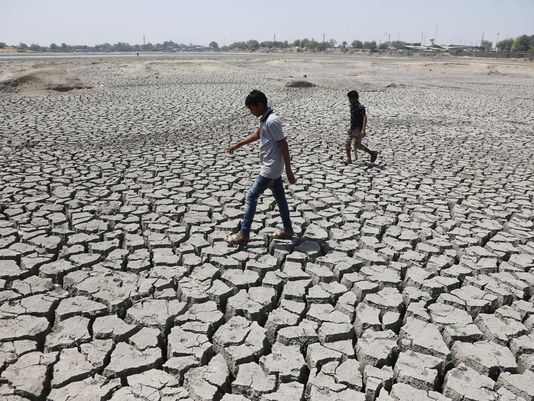Climate Change’s Impact on Human Health Is Already Here — And Is ‘Potentially Irreversible,’ Report Says
HEALTH, ENVIRONMENT, 6 Nov 2017
30 Oct 2017 – The U.S. federal government should adopt a strategy to manage climate change risks, as their cost to the government may rise as much as $35 billion per year by mid-century, a congressional watchdog office report released today said.
Climate change is already having an extraordinary impact on human health worldwide — affecting the spread of infectious diseases, exposing millions to air pollution and heat waves and dramatically reducing labor productivity, according to a report released Monday.
“The human symptoms of climate change are unequivocal and potentially irreversible,” the report by the British medical journal The Lancet says, and the situation is so serious that significant gains by modern medicine and technology are being undercut.
“The delayed response to climate change over the past 25 years has jeopardized human life and livelihoods,” the report says.
While most previous similar studies have covered the potential impact of climate change on future public health problems, the Lancet report goes a step further and illustrates how it is no longer a future threat but a present one.
The direct effects of climate change “result from rising temperatures and changes in the frequency and strength of storms, floods, droughts and heat waves — with physical and mental health consequences,” it says.
For example, from 2000 to 2016, there has been a 46% increase in the number of weather-related disasters, the report notes.
Some of the findings of the Lancet Countdown on Health and Climate Change report:
- Warming is exacerbating the spread of Dengue fever, the world’s most rapidly expanding disease. In fact, two types of mosquitoes’ ability to spread Dengue globally has increased by 9.4% and 11.1% since the 1950s.
- An additional 125 million people around the world were exposed to heat waves each year from 2000 to 2016 (as compared with 1986-2008), and a record 175 million people were exposed to heat waves in 2015.
- Rising temperatures have led to a 5.3% fall in labor productivity in the planet’s rural areas since 2000, with a dramatic drop of 2% from 2015 to 2016. In 2016, this effectively took more than 920,000 people out of the global workforce.
- Global exposure to dangerous levels of air pollution has increased by 11.2% since 1990.
- Climate change is also worsening allergies in the United States. For example, Americans faced significantly longer exposure to ragweed pollen in 2016 compared with 1990.
Cutting the greenhouse gas emissions that lead to global warming is necessary for public health, the report says. Reductions have already begun to occur across major economies, driven by the expansion of renewable energy and the phasing out of coal.
Curbing emissions could have immediate and substantial health benefits, the report says, such as cleaner air in previously polluted cities.
“Preventing illnesses and injuries is more humane, more effective and more economical than treating people once they’ve become sick,” said Howard Frumkin of the University of Washington School of Public Health, one of the study authors.
“That’s plain common sense,” he added. “What this report makes clear is that fighting climate change is disease prevention.”
Christiana Figueres, former executive secretary of the United Nations’ Framework Convention on Climate Change, said “the Lancet Countdown’s report lays bare the impact that climate change is having on our health today. It also shows that tackling climate change directly, unequivocally and immediately improves global health. It’s as simple as that.”
_______________________________________
 Doyle Rice has covered weather and climate for USA TODAY since 2004. From blizzards and hurricanes to tornadoes and floods, the USA’s wild weather keeps him busy.
Doyle Rice has covered weather and climate for USA TODAY since 2004. From blizzards and hurricanes to tornadoes and floods, the USA’s wild weather keeps him busy.
DISCLAIMER: The statements, views and opinions expressed in pieces republished here are solely those of the authors and do not necessarily represent those of TMS. In accordance with title 17 U.S.C. section 107, this material is distributed without profit to those who have expressed a prior interest in receiving the included information for research and educational purposes. TMS has no affiliation whatsoever with the originator of this article nor is TMS endorsed or sponsored by the originator. “GO TO ORIGINAL” links are provided as a convenience to our readers and allow for verification of authenticity. However, as originating pages are often updated by their originating host sites, the versions posted may not match the versions our readers view when clicking the “GO TO ORIGINAL” links. This site contains copyrighted material the use of which has not always been specifically authorized by the copyright owner. We are making such material available in our efforts to advance understanding of environmental, political, human rights, economic, democracy, scientific, and social justice issues, etc. We believe this constitutes a ‘fair use’ of any such copyrighted material as provided for in section 107 of the US Copyright Law. In accordance with Title 17 U.S.C. Section 107, the material on this site is distributed without profit to those who have expressed a prior interest in receiving the included information for research and educational purposes. For more information go to: http://www.law.cornell.edu/uscode/17/107.shtml. If you wish to use copyrighted material from this site for purposes of your own that go beyond ‘fair use’, you must obtain permission from the copyright owner.
Read more
Click here to go to the current weekly digest or pick another article:
HEALTH:
- U.S. Terminates Funding for Polio, H.I.V., Malaria and Nutrition Programs Around the World
- Autism, Made in the USA
- Big Pharma Is a Big Menace to Global Health
ENVIRONMENT:
